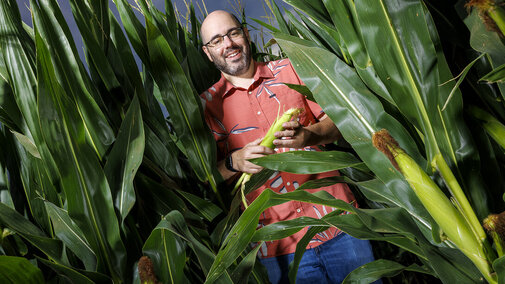A University of Nebraska–Lincoln research team has received funding from the U.S. Department of Energy to advance work on an innovative strategy for predicting the performance of corn hybrids in new environments.
The work is an important step toward commercializing new crop varieties that produce better results than today’s standard.
Plant scientist James Schnable received a $650,000 grant from the DOE’s Advanced Research Projects Agency-Energy to scale up a study his laboratory published earlier this summer. The research provided initial evidence that an RNA-based method could outperform current approaches that use DNA-based information to identify the functions of individual corn genes and predict the physical properties of the plants.
With the new funding, Schnable’s team will see if those original results, derived from experiments in Nebraska and Michigan, hold up when their method is applied to data from up-to-date hybrid varieties grown nationwide. The team will partner with collaborators in Nebraska and five other states to collect RNA data, fine-tune a predictive model, and compare that model’s results against those produced by some of the world’s best DNA-based techniques.
This next phase — the largest study to date focused on an RNA-based approach to corn gene identification and phenotype prediction — is crucial for transforming the team’s scientific breakthrough into a commercially viable product that will benefit farmers in Nebraska and beyond.
“By being able to test across many environments with really farmer-relevant genetics, we want to make the transition from a fundamental discovery to a technology that people can actually use,” said Schnable, Nebraska Corn Checkoff Presidential Chair and professor of agronomy and horticulture.
The work could help meet demand for increasing the productivity and efficiency of corn at a time when a rapidly changing environment — from longer growing seasons to variable rainfall patterns to new regulations focused on nitrogen pricing and herbicides — is complicating efforts to forecast which new hybrids will be the best ones to commercialize in the future.

